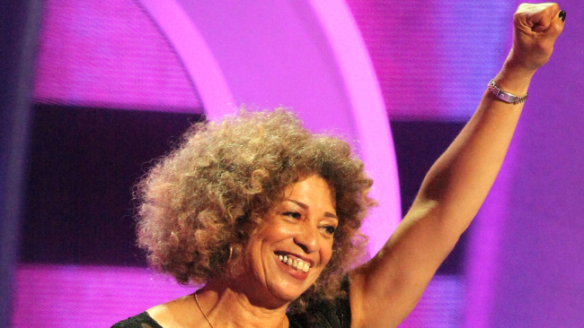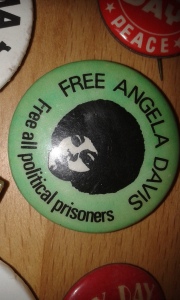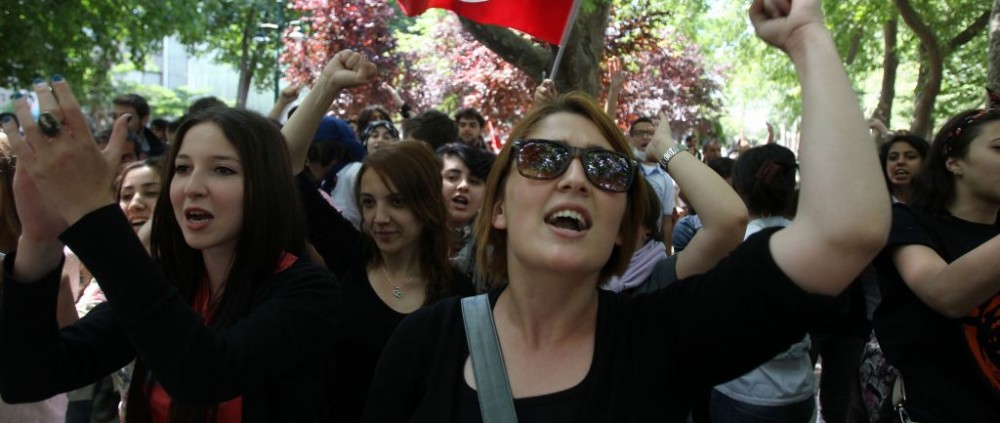 One of the first campaigns I can remember my mother being deeply involved in was the campaign to free Angela Davis from prison. I still have the Free Angela Davis
One of the first campaigns I can remember my mother being deeply involved in was the campaign to free Angela Davis from prison. I still have the Free Angela Davis  campaign badge in my collection. Leading up to her arrest, Angela was one of the ‘Ten Most Wanted Criminals’ in the US.
campaign badge in my collection. Leading up to her arrest, Angela was one of the ‘Ten Most Wanted Criminals’ in the US.
Angela Davis was born in 1944 in Birmingham, Alabama, the daughter of an automobile mechanic and a school teacher. The area where the family lived became known as ‘Dynamite Hill’ because of the large number of African American homes bombed by the Ku Klux Klan. Her mother was a civil rights campaigner and had been active in the National Association for the Advancement of Colored People (NAACP) before the organisation was outlawed in Birmingham. Angela attended a black elementary school and a local high school. By her junior year she was accepted into a program that placed black students from the South in integrated schools in the North. Angela chose a school in New York City. There she joined a communist youth group, Advance.
Angela was awarded a scholarship to Brandeis University in Massachusetts, where she was one of only three black students in her first year class. She initially felt alienated by the isolation of the campus, but soon made friends with foreign students. In 1962, she encountered the philosopher Herbert Marcuse at a rally during the Cuban Missile Crisis and then became his student. In a television interview, she said; “Herbert Marcuse taught me that it was possible to be an academic, an activist, a scholar, and a revolutionary”. She worked part time to earn enough money to travel to France, spent a year studying at the Sorbonne in Paris, before attending the eighth World Festival of Youth and Students in Finland. She returned home in 1963 to an FBI interview about her attendance at the communist-sponsored festival.
Soon after arriving back in the US, Angela received news of the Birmingham church bombing, committed by members of the Ku Klux Klan, an occasion that deeply affected her because she knew the eight young victims. In 1965, she graduated and in 1967 joined the Student Nonviolent Coordinating Committee (SNCC) and the Black Panther Party. She joined the Communist Party in 1968 after Martin Luther King was assassinated. She followed Marcuse to the University of California and earned her master’s degree from the San Diego campus and then her doctorate in philosophy from Humboldt University in East Berlin (GDR). By the beginning of 1969, Angela was an acting assistant professor in the philosophy department at the University of California. She was by now widely known as a radical feminist and an associate of the Black Panther Party. In 1970, when the FBI informed her employers that Angela was a member of the Communist Party, they terminated her contract.
Due to Angela’s activism in the support campaign for imprisoned Black Panthers member George Jackson and two of his fellow inmates (known as the Soledad Brothers) she became a serious target of state authorities. On August 7, 1970, George Jackson’s seventeen year old brother burst into a courthouse with a machine gun and took a judge hostage demanding George’s release. Jonathan Jackson was shot and killed driving away from the courthouse. On 21st August, 1971, George Jackson was gunned down in the prison yard at San Quentin. He was carrying a pistol and officials argued he was trying to escape from prison. The police claimed Angela had purchased the guns used in the hostage taking and smuggled into prison the gun being carried by George. Angela went underground and was named as one of the ‘Ten Most Wanted Criminals’ in the US. She was captured soon after, but an international campaign came to her support. John Lennon and Yoko Ono wrote the song Angela and Mick Jagger wrote the song Sweet Black Angel in solidarity with her. In 1972, Angela was acquitted. She wrote; “Our very survival has frequently been a direct function of our skill in forging effective channels of resistance. In resisting we have been compelled to openly violate those laws which directly or indirectly buttress our oppression. But even containing our resistance within the orbit of legality, we have been labelled criminals and have been methodically persecuted by a racist legal apparatus . . . “
After her release, Angela moved to Cuba, but soon returned to the US. She managed to achieve tenure at the University of California, even though the state’s Governor, Ronald Reagan, swore she would never teach again in the California system. Angela left the Communist Party to help found the Committees of Correspondence for Democracy and Socialism. She has continued to write ground breaking work on women, racism, and prisons, and to take part in numerous movements for change. Prisoner rights have been among her continuing interests; she is the founder of Critical Resistance, an organisation working to abolish the prison-industrial complex. She is presently a retired professor with the History of Consciousness Department at the University of California, is the former director of the University’s Feminist Studies department and a Distinguished Visiting Professor in the Women’s and Gender Studies Department at Syracuse University. Her research interests are in feminism, African American studies, critical theory, Marxism, popular music and social consciousness, and the philosophy and history of punishment and prisons.
Angela by John & Yoko/ Plastic Ono Band
Sweet Black Angel by The Rolling Stones
